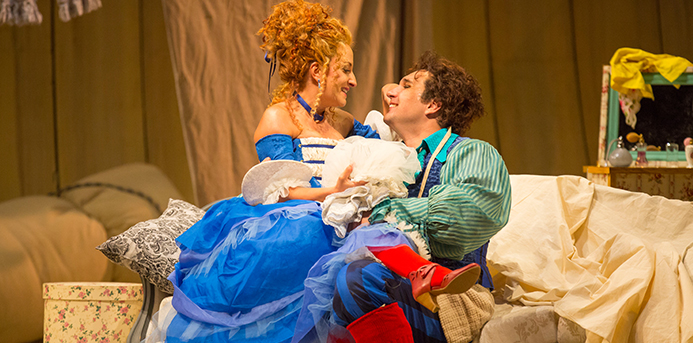“The Marriage of Figaro” is all about sex, and Director Barbara Gaines doesn’t let us forget it. In a new production at Lyric Opera of Chicago, which opened Sept. 26 at the Civic Opera House, she gives everything from adolescent longings to le droit du seigneur a humorous touch.
Gaines is founder and artistic director of Chicago Shakespeare Theater, so you can bet that the libretto looms large in her shows. Armed with particularly sassy super-titles, she easily has the audience in fits of laughter.
The story, set in 18th century Spain, is a continuation of Rossini’s “The Barber of Seville.” Count Almaviva, who was aided by Figaro as he ardently wooed the lovely Rosina, has married her, but by the time the curtain rises on this production, he has turned into a skirt-chaser. Figaro, now his valet, is about to marry Susanna, the Countess’ ladies maid. But the Count has eyes for the pretty bride-to-be, leaving Figaro with the challenge of outwitting him. He does, of course, but not until he’s been put through the wringer himself.
From the opening moments when a bawdy couple runs to the stage via Lyric’s side aisle, it is obvious that farce is the operative mode here. Costumes are brightly colored. Figaro and Susanna are both clad in vivid blue with red boots or leggings, the Countess lounges on her bed in fuchsia knickers and a matching floor-length taffeta robe with a train, while the Count wears a bright pink vest.
If the design of the first scene is not inspiring, it still has the requisite doors, lounge chairs and armoires necessary for escaping or hiding, which happen often in this comedy. However, subsequent scenes, including the magnificent chandeliers in the great hall, more than spark the imagination.
And, oh yes, the music. Mozart’s score is one of his most memorable, with one aria after another propelling the story to its happy ending. The cast sparkles. Czech bass-baritone Adam Plachetka, making his Lyric Opera debut, is Figaro, who, as he takes on the Count, finds he has been temporarily blindsided. His adorable Susanna is German soprano Christiane Karg in her American operatic debut. She is a true singing actress, who imbued her character with a flippant, flirtatious attitude. In the first act, Hungarian conductor Henrik Nanasi, also making his American debut, allowed the Lyric Orchestra to overpower her buoyant voice, but that was corrected as the night wore on.
The Countess is sung by glorious Illinois-born soprano Amanda Majeski, a Lyric favorite. Mozart gave her character his most beautiful arias, “Porgi amor” and “Dove sono,” in which she painfully laments the loss of her husband’s affection. Her voice is full and brilliant, and it obvious that Majeski is enjoying the whole panoply of emotions, including the production’s raucous comedy, though the food fight in her boudoir is a bit over the top.
The trouser role of Cherubino is sung with gusto by Israeli mezzo-soprano Rachel Frenkel. She deftly mimics the character’s adolescent awkwardness and bewilderment at his own infatuation with every female he meets. The perfidious count is sung by Italian bass-baritone Luca Pisaroni, who doesn’t bother to make his character one bit sympathetic. He sulks like a spoiled child, but is never clever enough to foil the plots against him. We hope his plea for his wife’s forgiveness is sincere, but don’t count on the count’s staying power.
The cast is filled with solid singers. American mezzo-soprano Katharine Goeldner is a marvelous Marcellina, relishing her comic role as the wedding spoiler, which she shares with her co-conspirator Bartolo, sung by British bass Bradley Sherratt. He establishes his powerful vocal credentials with his first act aria “La Vendetta.” American tenor Keith Jameson is Basilio, who enjoys helping to thwart Figaro’s marriage.
South African soprano Hlengiwe Mkhwanazi, a second-year member of the Ryan Opera Center, makes a good impression as Barbarina, Cherubino’s girlfriend, as does her Ryan colleague American bass Bradley Smoak, who is cast as Antonio.
Like many comedies, this opera ends with – you guessed it – the marriage of Figaro to his dear Susanna, as well as that of Bartolo and Marcellina, plus the reconciliation of the Count and Countess, at least temporarily.
“The Marriage of Figaro” runs through Oct. 24 at the Civic Opera House, 20 N. Wacker Drive, Chicago. For tickets and information on the full season, visit Lyric’s website or call 312-332-2244.
More from Make It Better:

